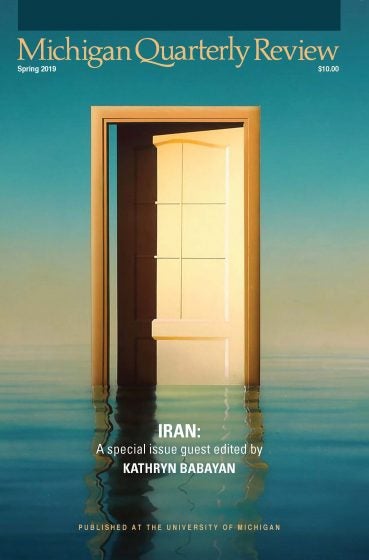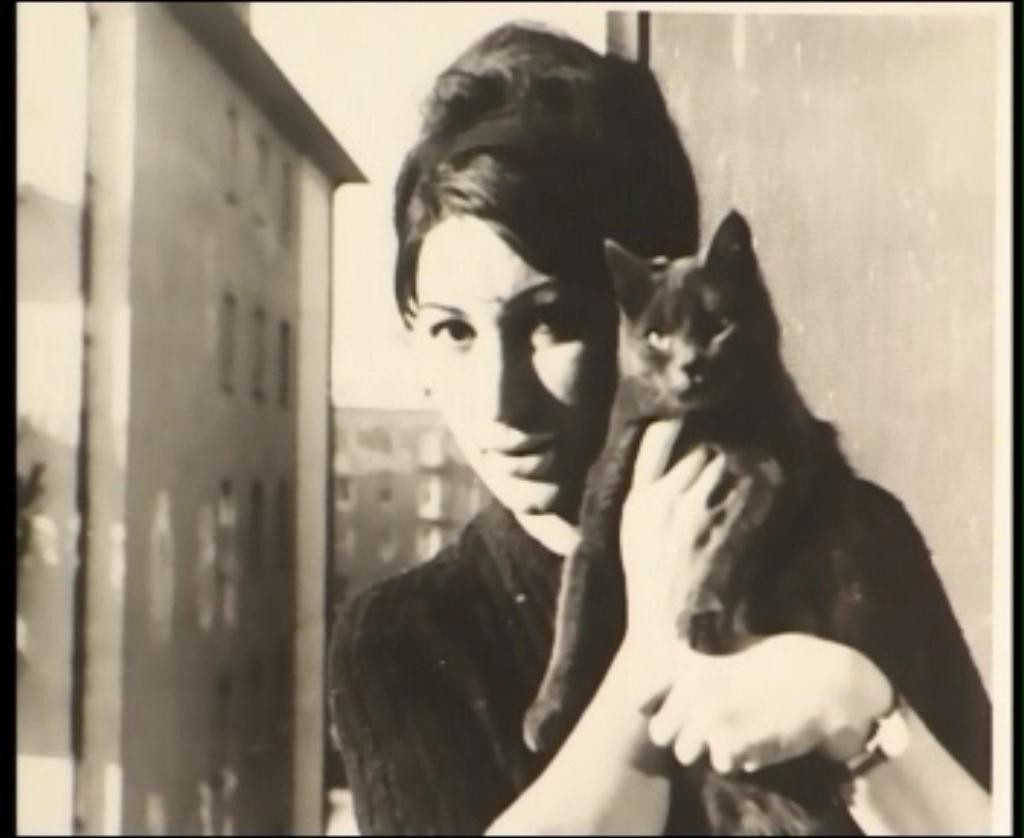Why I Chose It: Michigan Quarterly Review Fiction Reader Elinam Agbo introduces Dena Afrasiabi’s story “Ayatollahland,” from our Spring 2019 Issue: Iran.
Welcome to Ayatollahland, an Iran-inspired theme park in Houston, Texas, or as Dena Afrasiabi’s narrator puts it: “a place for the wistful, disconnected members of my parents’ generation to relive their pre-revolution days.” Our guide is a young woman on the ledge of belonging, stuck between “too American” and “not American enough.” In this “happiest Iran on Earth,” she is employed as the “Forugh Farrokhzad impersonator,” and in a place of isolation, the famous Iranian poet feels like a friend. Here is the heart of “Ayatollahland”—a search for connection. Gifted actress that she is, fake Forugh weaves us through literary tours and miniature stores, pausing to dip into the pool of familial history before moving on with her work, immersing us in her role. But as Mina, a newly arrived Iranian and a fellow impersonator, reminds her, “You can’t be Forugh forever.”
I chose this story for its brilliant balance of reality in a place of replicas, its emotional resonance and ingenuity. Afrasiabi navigates complex questions for immigrants at varying stages of assimilation, the everyday negotiations of “how to be” and “where to belong.” And where are the answers, especially when those roles and that place are with people who feel close to “home” and yet are still so far from you? What will it take to belong?
_________________________________________________________________________
I had just gotten to Ayatollahland, the Iran-inspired theme park outside Houston where I’d been working for the past three years. I was waiting by the replica of the Azadi monument to greet visitors as they arrived, when Babak, the thirteen-year-old pest who was always playing pranks, took the wig off my head and ran away. I pulled off my heels and chased after him barefoot, all the way down Vali-Asr Avenue, the main drag, past the miniature high rises, the police station, the university, and all the little souvenir shops and groceries that had just begun to open. I finally caught up to him near the train station.
Babak dangled the wig above the opening of a trash can, moving it slowly downward, then yanking it back up again, taunting me, even though I didn’t really care. If he threw it away, I’d just dig it out and smash it into his face later. But his unwarranted confidence irked me. That smug look on his face. He stepped onto the tracks and raised the wig high. When I got closer, I noticed he was holding another short-haired wig in his left hand. Then I saw something from the corner of my eye that made me do a double take. A girl on the platform: wearing my shirt and my corduroy skirt. For a second, I thought they’d installed a new mirror I didn’t know about.
The girl climbed up onto the train platform and snatched the wig from Babak’s left hand, spitting Persian too rapidly for me to understand—except for the curse words.
“Who the hell are you?” I interrupted. Ordinarily, I wouldn’t be so rude to a stranger, but I felt ambushed.
She looked offended. “I work here,” she said in English. Her accent sounded thicker than my mom’s, and she spoke more carefully, as if she were practicing each word in her head before she said it. “Who the hell are you?” She hesitated a little before saying “hell,” as if using the word for the first time.
“I’m the Forugh Farrokhzad impersonator.” I grabbed my wig from Babak’s right hand and slid it back on.
“That is impossible,” the girl said. “I am Forugh. They did not tell me we worked in shifts.”
“We don’t work in shifts,” I said.
I saw my own confusion spread across the other Forugh’s delicate face. And then it struck me like a car hitting a wall: I’d been fired and the bastards in human resources hadn’t even bothered telling me. This was probably how things worked in their country. They hired someone new and let them tell you to leave, like some fucked up hazing ritual. That was the problem with these newly-arrived Iranians. They went on behaving as if they’d never left Tehran and you had to accept it, as if you hadn’t been raised in Texas and indoctrinated with all kinds of rules and regulations. If you complained, they told you to lighten up. Aren’t Americans supposed to be cheerful, they would say. Why don’t you smile more? You could never win. Either you were too American, with your love for coffee and personal space and timestamped punch cards, or you weren’t American enough.
I left the new girl and Babak without saying goodbye and grabbed my bicycle from the rack near one of the bridges in fake Isfahan. Shahin, the boy I’d made out with a few times, waved at me from the kiosk where he sold artisan tiles, but I didn’t even smile at him condescendingly like I usually did. I felt blood pulsing inside my ears as I rode from fake Isfahan all the way to fake Qom, where the admin offices were located inside a sprawling fake mosque. I didn’t understand this place. Their slogan was “The happiest Iran on Earth,” with founders who claimed to be secular and non-partisan and apolitical, blah blah blah, a place for wistful, disconnected members of my parents’ generation to relive their pre-revolution days, but here they were setting up offices in Qom just like the ayatollahs they’d run away from…
Purchase MQR 57:6 or consider a one-year subscription to read more. Dena Afrasiabi’s story “Ayatollahland” appears in the Spring 2019 Issue of MQR on Iran.








